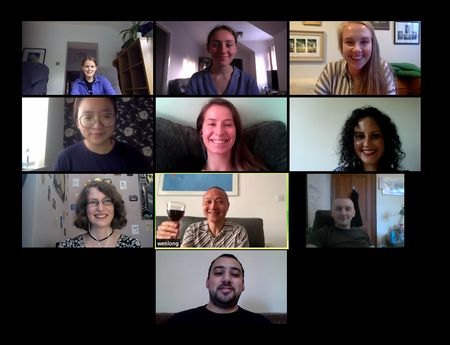Hello all, it is officially my seventh week as a summer intern at the University of Aberdeen’s Spinal Cord Injury Research unit. But first, let me introduce myself, I am Anastasia, a vibrant 21-year-old who loves to run, dance and has a natural voracious curiosity for science, particularly chemistry. More specifically, the organic molecular part of biology, (no-one likes inorganic chemistry (I kid of course)). Moving on, currently I have just finished the 3rd year of my Neuroscience degree and I am now progressing onto my fourth and final year. So naturally I was aiming to pick up on some experience. Alas, as you all know, COVID-19 beat me to my hypothetical finish line and robbed me of my lab experience. Nevertheless, I am somewhat of an optimist and my remaining hope (and through the hard work of others, but we’ll dismiss that for now) gave rise to an opportunity. I was blessed with the option of performing an online internship amidst the pandemic, with thanks to my host and co-supervisors as well as our sponsors/funders (Medical Research Scotland, University of Aberdeen HotStart Scholarship Programme, University of Aberdeen Development Trust and the Scottish Rugby Union). Don’t be fooled however, you must provide a pretty convincing argument for them to want to fund you.
So now a little more about this internship. I am performing my internship with a group of individuals known as the Aberdeen Spinal Cord Injury team. My head supervisor is Dr Wenlong Huang and for my particular project, my co-supervisors are Mindaugas Viskontas and Catriona Cunningham. Moreover, the aim of their research group is to tackle the uncurable effects of spinal cord injury (SCI) in hopes of finding a cure and improving the 2.5 million existing patients’ quality of life.
However, as previously mentioned, we could not perform any lab experiments this summer in search of SCI treatments, therefore we set out to do something productive with our time, something that can aid future experimenters. This being the project I am currently undertaking. So, my project is a systematic review and meta-analysis, which in brief, is a compilation and assessment of all the relevant experimental data surrounding a particular question of interest. In my case, this question is: ‘Can gene therapies promote functional recovery in clinically relevant in vivo models of spinal cord injury?’. In theory this review will enable other researchers to draw conclusions on current literature regarding gene therapies and their usefulness in promoting functional recovery post spinal cord injury. Thus, researchers can determine whether it is worth conducting a particular experiment or whether it is futile. Furthermore, creating a systematic review is not as simple as my short snippet of a definition, it requires a series of steps which one needs to dedicate a lot of time to and thoroughly check. I won’t bore you with all the steps but in short, one must first set out a specific and narrow question that addresses a relevant topic, they must then gather papers from multiple databases making sure they don’t miss any important papers, but also ensure they don’t get countless irrelevant experiments. Therefore, an advanced search must be formulated, which then gets sent off and moderated. Once accepted, the papers need to undergo screenings, whereby irrelevant papers are excluded, and relevant ones are kept. This is the stage I am currently on. Well, I am on the second screen and after hours upon hours of editing and excluding studies, I am happy to say I can take on any office job now. But now comes the interesting part of reading all the relevant papers, and actually learning about all these prior performed experiments, and gaining insight even if done so theoretically.
Moreover, I believe that this internship has not only provided me with a great deal of knowledge with behind the scenes science work, but also allowed me to engage with other respectable researchers. I have even been allowed to take part in their biweekly journal clubs, where I have presented my first analysis on a paper within neuroscience. As an undergrad with an audience of masters, PhD students and doctorates, I say, this was quite daunting to say the least. But I lived. Even made it to happy hour!
In conclusion I can honestly say that working with the Spinal Cord Injury Research team has been an absolute pleasure. Everyone is so friendly and outgoing, as well as talented in a countless number of ways (I have processed this through the vast number of images I have been sent on my WhatsApp “work” group regarding, mask making, pet training and an organised half marathon by the group- I mean WoW). This experience really has been very positive and only strengthened my love for science (which I didn’t think was possible). It has made me realise exactly how much I want to be in this field and how lucky I am to have found it. All I can say is, I cannot wait to begin my future as a research scientist.


